 Black metal drew to its camp many who experimented in extreme metal and punk but found themselves alienated by the ideas of the mainstream. Like fellow hybridizers Absurd, the intelligent Spear of Longinus found they wanted to borrow bits from many genres of extreme social rejection, and hoped to unify them around an ideology which explained both solid reasons for disliking society and suggested something positive in its stead. A roving ANUS.COM representative in Australia was able to catch up with these gents and exchange a few words.
Black metal drew to its camp many who experimented in extreme metal and punk but found themselves alienated by the ideas of the mainstream. Like fellow hybridizers Absurd, the intelligent Spear of Longinus found they wanted to borrow bits from many genres of extreme social rejection, and hoped to unify them around an ideology which explained both solid reasons for disliking society and suggested something positive in its stead. A roving ANUS.COM representative in Australia was able to catch up with these gents and exchange a few words.
In a time when it is popular to be ultra-black-metal in the modern sense, your music seems to have older inspirations. What bands and eras inspire your creation?
Camazotz: nowdays I listn to all kinds of stuff, though my ‘heyday’ was that fine time during the 80’s when the metal scene was at it’s best, say 82-89 or so. Sure there have been great releases at other times but the highest concentration was around these times especially as I like a lot of the punk/hardcore gear that was getting about at the time too. For example Discharge, The Exploited, etc etc. 80’s metal would of course be the likes of Destruction, Bathory, Frost, Possessed. Etc so in light of that , musik in this stlye must be alive with energy to get my enthusiasm. Modern proponents that have done this would be stuff like, Darkthrone, Burzum and earlier Emperor releases.
I feel that good metal should be more punk than metal to be good metal, if you can follow.
You see most modern metal feels lifeless to me, it has no particular focus apart from just being metal, whatever the hell that just exactly is …
Of course stuff like Wagner and trancendental compositions greatly inspire us now. For example Tibetan vocals, Indian sitar etc.The different ‘tribal’ styles that we still have which are in fact relics of occult teknikues/principles put into practice.
Paraplethon: Inspiring music would be that with a passion, a driving urge… honesty and integrity, that has something to say – either of a temporal or numinous nature, and has the ability to… affect and effect. THAT is inspiring, something of the like worth emulating. Metal, generally, hardly ever has any one of such worthwhile traits, let alone all of them, so at most it’s vaguely interesting but rarely inspiring…
The ‘outer reflects the inner’, the ‘muse-ik’ being one of the records of who, what and where we are – nothing more, nothing less.
What inspires the creation of individual songs: real world events, or thoughts and emotions?
Camazotz: ahhhhhh now that’s a profound question comerade, quite bluntly this stuff is a direct result of the dualastik clash between maya/atman, matter/antimatter.
what the Gnostiks call dualism.
What to us is ‘real’? is a chair real? Or, is the impression we receive of the chair , the chair(real)? If so, then what is the ‘origional’ chair, actually?
It is a result of the luciferian urge to regain the trancendental ‘throne’. The path of fools.
This material world is the ‘result’ of other ‘events’, the point being to get back to the ‘real’.
RISE.
Break down ALL barriers, in fact, to die is best!
DIE
DIE
DIE, MY DARLING, die within oneself.
LIBERATION. The return to PLEROMA.
Paraplethon: Define ‘real’.
It seems you have attempted to blend the spiritual and the political into a single entity; to many of us, these seem inseparable in the first place. How did you come to the realization that this was the path for you?
Camazotz: the path told us so… obviously!
Yes these things are inseperable, just as matter is spirit. Energy, in a different format. BUT, they are of course something totally different to each other at the same time. That’s where things get tricky and humans fall apart, they loose unity/focus and ability to progress. This is the inbuilt striving to attain the “overman”.
The clash of the Titans!
This is touched upon briefly and enigmatikly in our track ” the lay of spartazen “, which will be included on the upcoming release “…And the swastikalotus”.
Paraplethon: Inseparable is the word. The recognition dawned with the realization that ‘All and Everything’ is inseparable. Vague allusions to begin with, experiencing it first-hand is… makes it so much more of a certainty… a most profound experience.
In this respect, it is not enough to say that we are dealing with a purely material and economic conquest. That view seems very superficial, for two reasons. In the first place, a land that is conquered on the material level also experiences, in the long run, influences of a higher kind corresponding to the cultural type of its conqueror. We can state, in fact, that European conquest almost everywhere sows the seeds of “Europeanization,” i.e., the “modern” rationalist, tradition-hostile, individualistic way of thinking. Secondly, the traditional conception of culture and the state is hierarchical, not dualistic. Its bearers could never subscribe, without severe reservations, to the principles of “Render unto Caesar the things that are Caesar’s” and “My kingdom is not of this world.” For us, “Tradition” is the victorious and creative presence in the world of that which is “not of this world,” i.e., of the Spirit, understood as a power that is mightier than any merely human or material one.
This is a basic idea of the authentically traditional view of life, which does not permit us to speak with contempt of merely material conquests. On the contrary, the material conquest is the sign, if not of a spiritual victory, at least of a spiritual weakness or a kind of spiritual “retreat” in the cultures that are conquered and lose their independence. Everywhere that the Spirit, regarded as the stronger power, was truly present, it never lacked for means – visible or otherwise – to enable all the opponent’s technical and material superiority to be resisted. But this has not happened. It must be concluded, then, that degeneracy was lurking behind the traditional facade of every people that the “modern” world has been able to conquer. The West must then have been the culture in which a crisis that was already universal assumed its acutest form. There the degeneration amounted, so to speak, to a knockout blow, and as it took effect, it brought down with more or less ease other peoples in whom the involution had certainly not “progressed” as far, but whose tradition had already lost its original power, so that these peoples were no longer able to protect themselves from an outside assault.
– Baron Julius Evola, On the Secret of Degeneration
What experience or realizations do you hope to communicate through your music?
Camazotz: more light.
Buddhism, in the summarization of Herr Nietzsche, is a self-denying religion, where it seems that most of the western tradition is self-affirming, although not perhaps in the ultra-limited-focus of self-based religions (Judaism, Christianity). In your view, how do Buddhism and National Socialism spring from the same origin?
Camazotz: everything springs from the same source.
All good and evil, is in fact, evil and good.
But we can play with words all day, frederika and bhuddhism say the same things, they’ve used the same kinds of terms though with different definitions attached. Like we said before, this is where the humans cease to function appropriately.
For example the term ‘ego” some use this to denote the highest qualities , while some use it to denote the lowest infrastructures.
The “self” in the purest occult definition is a separate atom, free from its contaminated restricted material existence. ( Karma.)
The “self” is the purified/liberated “being” , free and purified of the gross material contamination. The actual “self” cannot be restricted to the tri-dimensional realm, that we are currently chained to.
This is alchemy, all of egypt.
Primal christianity eg. Gnosis, is probably the mediator needed here to make sense of these issues.
The goal of national socialism , the result that is intended to be achieved , is the superman.
The superman is the overman, the man that has overcome his limitations and regrown to a super (from our present involuted state) level of being.
A bhudda, or, bohdisatva depending on the level achieved.
Angel or Archangel, if you’d like to use these terms.
Some resonate with the uber and untermenschen terminologies, its all the same .
I would at this point encourage humans to find a nice rock under a tree on a mountain by a stream amd meditate your brains out on these issues.
Paraplethon: It is perhaps self-denying in order to be truly self-affirming; the movie ‘Fight Club’ deals with these concepts pretty well.
The terminology may differ between Buddhism and NS, or between NS and any other traditional philosophy, though ‘terminology’ is just that – an outer husk whose only use is an attempt to describe, or in some instances plainly label, the ‘inner guts’ – the unseen thing within that is the whole value and point to the philosophy. And further than that, NS being a modern re-formulation, in such a dire time and circumstances, was and is bound to be different.
Where they are similar, one and the same even, is their concern with the development of a greater wo/man; the advancement of wo/man, and the means by which to get there aren’t really all that far removed either.
The foundation of every true State is the transcendence of its own principle, namely the principle of sovereignty, authority, and legitimacy. This essential truth has been variously expressed in the course of history; if this truth was not recognized, the meaning of everything that belongs to political reality would be misunderstood, or at least distorted. Through the multifaceted variety of these forms we always find as a “constant” the notion of the State as the intrusion and the manifestation of a higher order, which is then actualized in a power. Therefore, every true political unity appears as the embodiment of an idea and a power, thus distinguishing itself from every form of naturalistic association or “natural right,” and also from every societal aggregation determined by mere social, economic, biological, utilitarian or eudemonistic factors.
In previous eras it was possible to speak of the sacred character of the principle of sovereignty and power, namely of the State. For instance, the ancient Roman notion of imperium essentially belonged to the domain of the sacred. This notion, in its specific meaning, even before expressing a system of territorial, supernatural hegemony, designated the pure power of command, the almost mystical power and auctoritas inherent in the one who had the function and quality of Leader: a leader in the religious and warrior order as well as in the order of the patrician family, the gens, and, eminently, of the State, the res publica. In the Roman world, which was intensely realistic (or, I should say, precisely because it was intensely realistic), the notion of this power, which is simultaneously auctoritas, always retained its intrinsic character of bright force from above and of sacred power, beyond the various and often spurious techniques that conditioned its access in different periods.
– Baron Julius Evola, Men Among the Ruins
Do you see the individual as existing outside of a political and social context, or necessarily as part of one, even when attempting to avoid the issue?
Camazotz: the individual is in fact multidualastik.
The idea is to be a part of this world, but not of it.
Be separate and observe, but also be productive and interactive.
This is the key. You need both polarites to proceed. Balance.
The individual or ‘self’ not to be confused with the human organism, should be somewhat “above” the mechanical systems, overseeing, if you will. Guiding.
You will after some time of practicing these tekniques be conscious of the seperation/observation, then you can really get to work.
Politiks and social environment are unavoidable, they are necessary for the revolution.
At the base end of the scale, they are the extent of most peoples ‘realities’. They are therefore necessary tools to be utilised. Fortunately those who ‘know’ can work towards something numinous.
Paraplethon: The very term ‘individual’ presupposes such. Though, probably more-so nowadays than in the past a person is wholly defined by their interaction with certain groups of people – socializing, and by their working/financial position, both of which, generally speaking, are accepted as going on to form the basis of a person’s ‘political persuasion’ – the ideas and concepts concerning the nature of society, the person and the environment they hold to be true, ‘the best’ and seemingly self-evident, there is more to it than base temporal factors.
There is in each person a unique and most vital element to their being, this is the essential spark that travels from incarnation to incarnation, the immortal animator of our being. It is variously referred to as ‘the Ego’, by Gurdjieff and many others; ‘the Essence’, Yeats called it the ‘Anti-Self’, and in Alchemical circles its one of the things going be the name of ‘sulphur’. With the recognition of the essence, the awakening process, and the nurturing of it – bringing it forth into full flower – that’s when the doors of perception really start to open, when we discover our extra senses and so forth.
This process, that we just as might call ‘individuation’, is however barred; the path is blocked by our accretion, whilst physically incarnate, of shallow, hollow, most ephemeral notions of our identity – such as was mentioned in the ‘socializing’ and ‘social strata’ circles – the region of the cult of the personality. These ‘psychological aggregates’ are rooted in our all too willing reckless identification solely with the material plane when we find ourselves physically incarnate. So in order to uncover the real, hidden essence that is our being, where the realm of UNDERSTANDING is to be found, rather than just “knowledge of this, that or the other”, the false impression of what we believe to be our identity must be sloughed off to allow our being to breathe. It was in this area, the ‘Golden Dawn’ had a test wherein the candidates had to converse without using any first personal pro-nouns; i, my etc, etc…
So, yes, people CAN be individuals if they choose to put the effort in, otherwise yes, we can be defined by a social and political context. As for ‘avoiding the issue’, the making of petty excuses or whatever to not deal with the situation as it stands; ‘because’ has fallen; “now is the time of the Fall of Because.”
What is your feeling regarding democracy as a system of government?
Camazotz: seemed like a good idea at the time …..
as with any other failing, generally speaking it is the human factor that fucks it. the untermensch ‘ego’ . most systems have something to offer , at least in theory. but if there is a fault, the human scun will exploit it.
Paraplethon: It does appear to be a good idea in theory. Perhaps it works only on the small scale in practice; medieval Iceland for example.
The most valuable insights are arrived at last; but the most valuable insights are methods.
All the methods, all the presuppositions of our contemporary science were for millennia regarded with the profoundest contempt; on their account one was excluded from the society of respectable people — one was considered as an “enemy of God,” as a reviler of the highest ideal, as “possessed.”
We have had the whole pathos of mankind against us — our conception of what “truth” should be, what service of truth should be, our objectivity, our method, our silent, cautious, mistrustful ways were considered perfectly contemptible —
At bottom, it has been an aesthetic taste that has hindered mankind most: it believed in the picturesque effect of truth, it demanded of the man of knowledge that he should produce a powerful effect on the imagination.
This looks as if an antithesis has been achieved, a leap made; in reality, the schooling through moral hyperbole prepared the way step by step for that milder of pathos that became incarnate in the scientific character —
The conscientiousness in small things, the self-control of the religious man were a preparatory school for the scientific character: above all, the disposition that takes problems seriously, regardless of the personal consequences —
– F.W. Nietzsche, The Will To Power
Which ancient societies do you respect most, and why?
Camazotz: atlantean and lemurian.
These are the ones which I have the most vivid recollections of. They were superior to our present era as humans involute instead of evolute, as opposed to what the corrupt ones would have us believe.
These were what we would call ‘high’ cultures as they were organicly minded, of course the atlantean degenerated to a material teknology based system which set the mood for our current situation of disaray .
Organik civilisation is spiritual civilisation.
Blood and soil.
This level of being had a totally different outlook to the present. In those times the human was the teknology to be perfected, not , an outside material construct for humans to dump their shortcomings on to create even more limitations to the acheivement of human potentials.
Less is more.
You see energy is matter and matter is spirit. Therefore energy is spirit. So why would one externalise spirit instead of working internally/esotericly? Why would one waste their ‘quota’ of immediate potential on external materialism??????? This is why the great civilisations of old look so backwards to the uninitiated, the advance is hidden to them.
Stone,timber etc these natural materials are infinately more powerful to work with and beneficial as they are still the living energy of the elements/elementals which reside therein. Blood and honour.
Paraplethon: None more-so than others. There is something to be learned/gained from ALL quarters; it si a very general statement though we had something in times pat that we’ve definitely gone and lost in the 20th Cent. However, it doesn’t do to dwell on ‘what once was’ and forget to live; the present is the only time worth our energies.
Machiavelli says it is better to be loved than hated, but much harder to be loved by the fickle nature of populations. Do you see this as being a sentiment of the original “fascist” ethos?
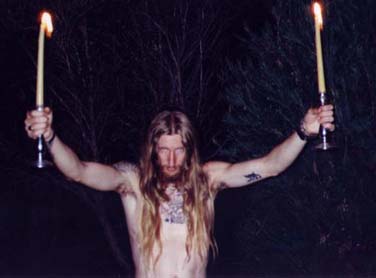
Camazotz: naturally ’tis better to be loved than hated.
Hate will destroy you. This is not to be confused with a healthy adversity, which promotes growth and strength.
Naturally fascism recognises the way populations behave, I think everyone would know this wouldn’t you? The trick is to achieve FOR the people, especially if they do not at the time recognise what is best for them. Fascism does this.
Paraplethon: Not particularly… it sounds more like something out of ‘the successful propagandists handbook’ or something. The sort of thing anyone remotely concerned with having good PR would take note of… hardly a ‘fascist ethos’ as such.
The everlasting qualities of Varna and family traditions of those who destroy their family are ruined by the sinful act of illegitimacy.
– The Bhagvad-Gita
The fascia, from which fascism derives its name, is a bundle of reeds with an axe head attached at their center; the symbolism is in theory that while sticks break individually, together they are strong. Is there any unity toward a common goal in modern governments?
Camazotz: of course! It is a new world order after all!
We could go into all kinds of discussions regarding parties , wings and all manner of political doctrine, and really I think most of them do at least have something positive to offer.
But they fail because of the human element.
Humans are not perfect, we must perfect the humanoid psychologicly/spiritually, to reflect that in the social environment.
This is what the movement should be working at.
This is what okkult NS and Fascism is all about.
This what all religions are about.
This is the heresy we embrace.
This is the REVOLUTION we instigate.
This is what we practice.
This is what we preach.
Paraplethon: Yep, ‘strength through unity’, ‘united we stand, divided we fall’ etc…
The ‘common goal’ they’re intent on scoring is the complete enslavement of humanity as an identity-less, racially indistinguishable mass of automatons.
As dire as the current situation is, that we are here talking openly about their nefarious aims is proof enough we’re not yet living through our darkest hour, though it is very dim, very grim.
However, what we are witness to isn’t a particularly united/common front; there are those in varying amounts of agreement, from the rabidness of the US, Israel and Australia to the more wary French and Russians to those who remain definitely outside the fold; Iraq and Libya for instance. It must be pointed out though it isn’t only those countries labelled ‘evil’ by the worlds punch-drunk bully – the US, that remain on the outer; there is a semi-autonomous region of Siberia, perhaps the last place on the planet since the fall of Tibet, where governmental decisions are guided by spiritual elders, in this case shamans, whose aims are more along the lines of freeing the mind and spirit rather than enslaving and controlling them. And as for the recent US actions designed to stamp out any opposition to its aims as mentioned above, well Nelson Mandela makes it clear where he stands; “They think they’re the only power in the world. They’re not and they’re following a dangerous policy. One country wants to bully the world… If you look at these matters, you will come to the conclusion that the attitude of the USA is a threat to world peace.” Newsweek, 10th Sept. 2002.
It’s the Kali-Yuga, revel in the dischord and strife…
Have you had any problems with labels, fans, clubs or others because of your political views?
Camazotz: yes,
we have had some interest from a bike club due to us using “their” image.
We have had trouble with certain skin movements.
We have had trouble with the media.
We have trouble with %98 of the musik community finding it next to impossible to get gigs, advertising, label interest etc. and that is including the ‘pagan’ metal heretiks!
Also certain magikle societys in all their illumination, don’t get it.
Herr Nietzsche referred to Christianity as a great evil that, were it not to exist, would have to be invented. He also said “that which does not kill me, makes me stronger” in regards to experience — in your view, what is the experience — both personal and cultural — of overcoming christianity, and what strength does it create?
Camazotz: sorry this question was lost somehow.
Paraplethon: Firstly, ‘christianity’ is a VERY loaded word, so you would have to begin by narrowing your scope and define exactly what sort of christianity here is to be overcome. An example of how much variance/difference there is in the christian experience is Origen of Alexandria, a church elder of the 2nd or 3rd cent., who at his death was officially deemed a saint. However, some time later – a few hundred years or so, Origens position was re-evaluated, it was determined his Neo-Platonism didn’t sit well with what the church had become and so his writings were banned, or burned, his sainthood was revoked and he was declared a heretic. The rather drastic change in the opinion of Origen mirrors the devolution of mass christianity as a whole, culminating with the final purge of the esoteric aspect of the religion in the 15th cent. or thereabouts, whereafter the ‘Church of Rome'(and its offshoots…) were more or less just the outer husks/the misunderstood whispers, not much more than some meaningless moral code.
Esoteric Christianity, the real ‘inner guts’ of the movement – that which gives real meaning and value to all the rituals, practices and moralizing of that outer husk – the Roman Church, was forced underground.
So what aspect of christianity is to be overcome? The outer, exoteric branch everyone is familiar with? Fine, if you were to do so, you’d be taking the first tentative steps towards realizing that old maxim ‘Know Thyself’.
At its core, Esoteric Christianity IS a method, a philosophy of overcoming, of overcoming oneself – sounds somewhat similar to Nietzsche doesn’t it? Of course the terminology is different, but who cares for the terminology, it’s merely an attempt to describe the heart of the matter, there’s bound to be differing terminology as every ones experience os going to be unique to themselves.
However, the heart of the matter IS the same.
Europe is about to outlaw “hate speech” online through a program named Princip, after the assassin who started World War I. Of what do you believe this is a portent, and how do you think it will be circumnavigation?
Camazotz: I knew this was on the drawing board, but had no idea it was to be implemented at this point. Surely people can see that this is unbalanced?
anything can be circumvented. That’s how the whole internet thing came about in the first place. I feel the ‘left’ in all their glory should be assissted in their efforts to save the free speech that is still available. By that I mean whatever factions are still opposing these actions. In fact there should be more work with the ‘left’ alltogether.
This is ignorance in full flight.
This we must fight.
Lest we face the great night.(again &again&again.)
Ignorance can only breed ignorance, fear , restriction etc.
There must be dialogue/interaction with all factions and cults to make any progress in this world.
Together we are strong.
A good lesson in the cosmik principle of recurrence here don’t you think? Nothing should be repressed, this is the tao, more light.
Just what constitutes hate speech etc? The talk of fools.
It’s like this race question.
Those who want to be separate should be separate, those who want to mix should mix. Quite simple really.
A good analogy would be the olympik games, and the drug testing/bans etc.
I think there should be separate events where the competitors can shoot up absolutely any shit into their organisms they want. Hell they can even get nuclear powered bioniks in these events for all I care, go for it. We will see where that leads.
But there must be room for purity too.
I would recommend keeping records though, I don’t fancy getting lined up with a sheilagh that has had some kinda ape genetiks crossed so she can win a gold medal at gymnastiks or something.
Paraplethon: A portent? Orwells ‘1984’, Huxleys ‘Brave New World’ – that’s what a constriction on open dialogue and criticism is a portent of.
Do you have any interest in encryption? Or religious cryptograms?
Camazotz: encryption is a tool to be utilised like any other at the correct time and place. Aside from the allegory and symbols of regular occultism/ alchemy etc I’ve not really looked at encryption etc.
I take it you mean stuff like ‘the bible code’ etc?
I have read some on the ‘real’ jesus and such nationalist type things if you mean these?
Of course all secret societys have their encrypted ‘codes’ too.
Sometimes you will find things in our releases if you were to be vigilant.
Of course you can take that to another level in that this world is illusion , so through using the tekniques of the esoterik warrior one would be working in this fashion , ja?
“That’s all she wrote,” the Finn said. “Didn’t finish it. Just a kid then. This thing’s a ceremonial terminal, sort of. I need Molly in here with the right word at the right time. That’s the catch. Doesn’t mean shit, how deep you and the Flatline ride that Chinese virus, if this thing doesn’t hear the magic word.”
“So what’s the word?”
“I don’t know. You might say what I am is basically defined by the fact that I don’t know, because I can’t know. I am that which knoweth not the word. If you knew, man, and told me, I couldn’t know. It’s hardwired in. Someone else has to learn it and bring it here, just when you and the Flatline punch through that ice and scramble the cores.”
“What happens then?”
“I don’t exist, after that. I cease.”
“Okay by me,” Case said.
“Sure. But you watch your ass, Case. My, ah, other lobe is on to us, it looks like. One burning bush looks pretty much like another.”
– William Gibson, Neuromancer
Are there any similarities in your view between the Qabbalah (pre-Judaic) and the tree of life in Nordic religions?
Camazotz: you need ask? Of course.
Paraplethon: They are differing cultural descriptions of the same phenomena; physical worlds coming into being and the polarity to such.
Buddhism and National Socialism both emphasize discipline and a rational, non-superstitious, non-dogmatic approach to decoding philosophy, nature and the sciences. Is this congruent with the beliefs of the west at this time, or has a contravening force taken over?
Camazotz: the west has tapped into and let loose many principles/powers that have taken on their own momentum/agenda. Some of these do indeed work against the agenda of liberation but it’s all part and parcel of the package deal we bought off god at that clearance sale a few years back … it is all encrypted on that nordik tree of life you were alluding too b4 ha ha.
Be alert as the sentry in war.
Continue with the process and you will get the result.
What do you expect when we live so far from galatik centre? When it is within ones ability to upgrade to a double sun, you will still know the answer to yesterday, though not today.
The further you climb, the further you can fall.
Paraplethon: Rational? Non-superstitious? What form of NS are you referring to???
The very world we live in today is the consequence of 200-300 years of rationalism, denigration of superstition, and NS stood in direct opposition to this degenerate society; NS was a civilization unto itself.
Though what is ‘superstition’, being that most people have some sort of preconception. Superstition; tradition, myth, legend, perhaps a ‘cultural base’. Let’s go out on a limb and say perhaps all myth, legend, tradition(‘superstition’) is but a system existant to give us the means to negotiate our multi-dimensional reality at our will. THAT seems quite rational…
To attempt an interpretation of ‘superstition/myth’ purely from the physical/temporal point of view is quite ‘irrational’, though to do so would result in the conclusion that ‘superstition/myth’ IS itself quite ‘irrational’… whatever…
When you write lyrics, which is more important: exact meaning or the sense and sound of language?
Camazotz: that’s a funny question . As you will find that the ‘vibe’ or sense and sound as you put it. IS the exact meaning. Words can never give the truth, only a close approximation. That’s why letters have a kabbalistik corespondence, to get closer to what the real deal is. Also that’s why we need to utilise the layering of sounds with the words and such, to get as close as possible to the particular atomik rotational condensation as we can. Somewhere within the yin and yang polarities of that atomik field we will find the exact mathematical fraction hinted at.
You must do some travelling.
Do you read any philosophers or social theorists and if so, what doctrines do you find relevant to the current time and its discontent?
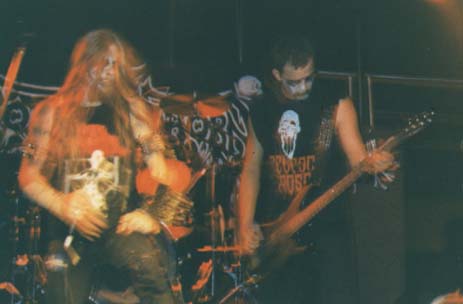 Camazotz: I rarely read at all these days. It just dosen’t hold my attention at all anymore. Now we work more practically with the meditations and such. The intellect rarely serves its master satisfactorally.
Camazotz: I rarely read at all these days. It just dosen’t hold my attention at all anymore. Now we work more practically with the meditations and such. The intellect rarely serves its master satisfactorally.
Simple observation and reflections will give you any informations that these types of pushers try to get thou addicted to. Only it will be pure and internally relevant to YOU and you’re peculiar frequency/orbit.
In addition to that, the big draw back is that people just go around adding all this information to their little brains, without actually utilising any of it or DOING anything. A bit of a waste of time really.
If I read anything now it is scientifik/okkult. Which is first applied on an intellectual level then passed on to the dan tien, then hopefully we can really do some work psychologikly. Which itself begins at the ritual level, then moves deeper.
Paraplethon: Chomsky, Hakim Bey, Alexander Dugin, Qadhafi… David Icke appears to be more daring and goes a bit further than the others.
In your view, is history a linear process with a clear end-point at which a triumph of development can be proclaimed?
Camazotz: if one followed this point of view , it could only be the triumph of death/dekay/involution. History is cyclik in both its ups and downs, every point is only a decimal on the way to another point . My answer to your question is , no.
Paraplethon: Think ‘cyclic’, in terms of ‘aeonics’, development, triumph, degeneration, decay, multiplicity, unity etc…
Saying that though, you’d have to have rocks in your head to still have faith in the ‘cult of progress’.
It seems in light of recent events, previously demonized political worldviews are gaining some ground in the mainstream, albeit in pieces separated from the whole, much as Christianity was absorbed. Do you think these beliefs will synthesize with current “popular knowledge” or will a splinter society be created?
Camazotz: a splinter society? Not for some time I’m afraid ( not in a positive way anyhow ), unless you want to count people such as Islam, Iraq and North Korea etc. we must promote the invisible empire, to be within the ‘system’ but not of it. To not be restricted by it, that is. Utilise it, be the master.
You must see that that is in fact the problem, society is too splintered. The sleepwalker cannot even see the line , neveralone know which side to stand on. Anything that has been assimilated has really been the grosser aspects of doctrines, with no depth to really make a positive difference. And who will lead this splinter society?
Paraplethon: Any ground gained is more likely the carrot dangled in front of us, so watch out for the big stick. They don’t seem like people willing to give up their power, or even share it around a little…
I’m sure people have asked this to death, but what do you think was achieved by the Al-Qaeda bombing in Bali in which 180 people, mostly Australians, were killed?
Camazotz: I guess they got rid of a few round eyes from their country. we got what NWO wanted.
Paraplethon: Al-Qaeda? Really???
About the only thing that was achieved was for 2-3 weeks sports wasn’t the most important thing in the lives of average Australians.
Of which work of the band are you proudest? Do you see an evolution in the process of your works?
Camazotz: we try not to stagnate. But then again a change is not necessarily a good thing, hopefully we can rebel in a positive fashion. I think the standard answer is that what ever is most recently released, is the best, ja!
Actually I try not to be attached to anything that’s been done, or will be done.
Paraplethon: The best thing about SOL is the concious attempt to influence others.
At least here in Texas, it seems to be hard to come by Spear of Longinus merchandise or recordings. Will this change at some point, and will you re-release older material?
Camazotz: older stuffs will be re-released as time goes by hopefully in ‘revamped’ formats. Just as soon as THEY let go, our stuff will be easier to get a hold of. Then we will also be featured on “top of the pops” wont that be grand ………. then the prism of perspective can take us away to the light cone.
What inspired the choice of band name?
Camazotz: hadit.
Has metal grown from the black metal experience, or are we in a lull between developments of metal and thus bands are turning to traditional, proven formulas for aesthetics?
Camazotz: metal has grown but it is also in a lull.
You will find that the traditional motifs will eternally recur, hopefully in ever flourishing octaves.
The humans are doing the best that they can…. Poor creatures
Paraplethon: Don’t have much to do with ‘metal’ anymore, listen to it now and then, that’s about it… ditched it when that whole ‘retro’ thing took off…
Camazotz: hear hear, fuck retro.
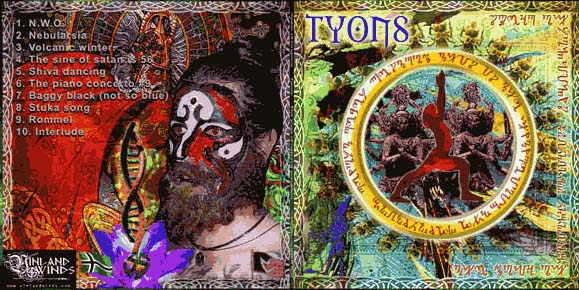
It seems many American Christians support Israel because in the Christian view, an “end times” is coming and one of the signs of its arrival is Jewish repossession of their homeland. Could this be one of those prophecies that is ultimately self-fulfilling and nothing more?
Camazotz: the material realm is not always a faithful reflection of the superior. In fact my kitty kat is black.
The most unfortunate thing is that humans do not understand the symbolism employed.
They mix up the metaphysical internal with the terrene external. Ignorance doom flux.
Join a kult and make it prosper.
Paraplethon: The ‘end-times’ aren’t peculiar to just christians, there’s quite alot that culminates in the period 1960-2040, or even prior if you want to count Crowley’s proclamation of the ‘Aeon of Horus’ in 1904 or whenever it was. Just what do the ‘end-times’ signify though, that’s the more interesting question.
To answer your question though, on the face of it, it would appear to be somewhat of a self-fulfilling prophecy, with the various other evidence pointing towards an ‘end-times’ however, it is safe to say there is something in the air.
In your personal lives, do you watch television, movies, play video games, or use any drugs?
Camazotz: no drugs
no video games
no tv.
Occasional movies.
All you have is your training, you must be what you are independent of external influences.
Paraplethon: Movies… especially the ones with the esoteric undertones…
Why waste time with that other junk – “all we have to do is decide to do with the time given us”, what will you do?
Please insert anything here i’ve missed or which has been only covered obliquely.
Camazotz: thanx for the time and space mate.
Metal is dead, long live metal.
Sorry we didn’t put enough energy into this mate, but hopefully people can get an idea about it all from this. Be a practical particle, be sincere, and HE will come.666.
Von sol
Doomcrust.
Paraplethon: Nah, that’ll do… Thanks.
Spear of Longinus Homepage
spearoflonginus@yahoo.com
No CommentsTags: spear of longinus
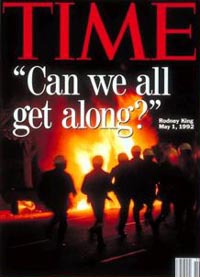

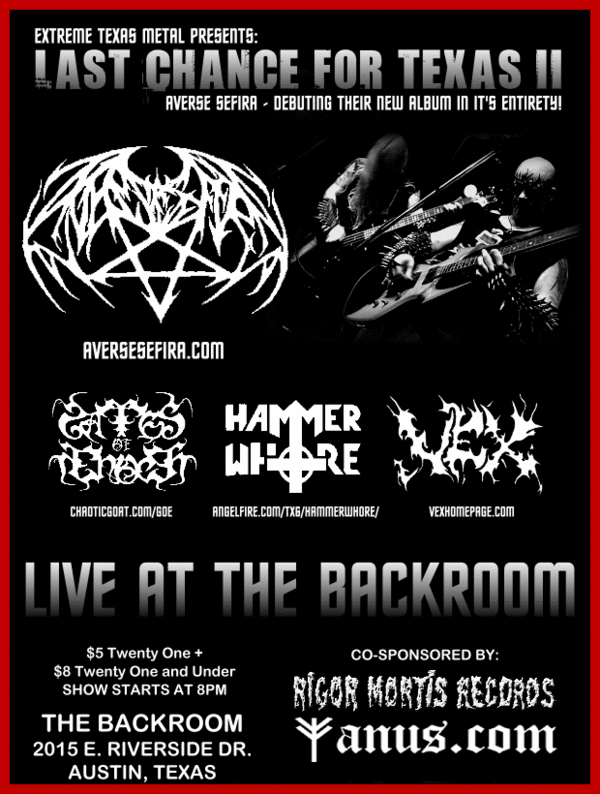
 Black metal drew to its camp many who experimented in extreme metal and punk but found themselves alienated by the ideas of the mainstream. Like fellow hybridizers Absurd, the intelligent Spear of Longinus found they wanted to borrow bits from many genres of extreme social rejection, and hoped to unify them around an ideology which explained both solid reasons for disliking society and suggested something positive in its stead. A roving ANUS.COM representative in Australia was able to catch up with these gents and exchange a few words.
Black metal drew to its camp many who experimented in extreme metal and punk but found themselves alienated by the ideas of the mainstream. Like fellow hybridizers Absurd, the intelligent Spear of Longinus found they wanted to borrow bits from many genres of extreme social rejection, and hoped to unify them around an ideology which explained both solid reasons for disliking society and suggested something positive in its stead. A roving ANUS.COM representative in Australia was able to catch up with these gents and exchange a few words.
 Camazotz: I rarely read at all these days. It just dosen’t hold my attention at all anymore. Now we work more practically with the meditations and such. The intellect rarely serves its master satisfactorally.
Camazotz: I rarely read at all these days. It just dosen’t hold my attention at all anymore. Now we work more practically with the meditations and such. The intellect rarely serves its master satisfactorally.
 What motivated you to get into metal?
What motivated you to get into metal?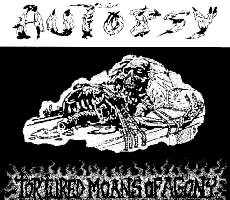 Do you think anything in nature has a single cause?
Do you think anything in nature has a single cause?
